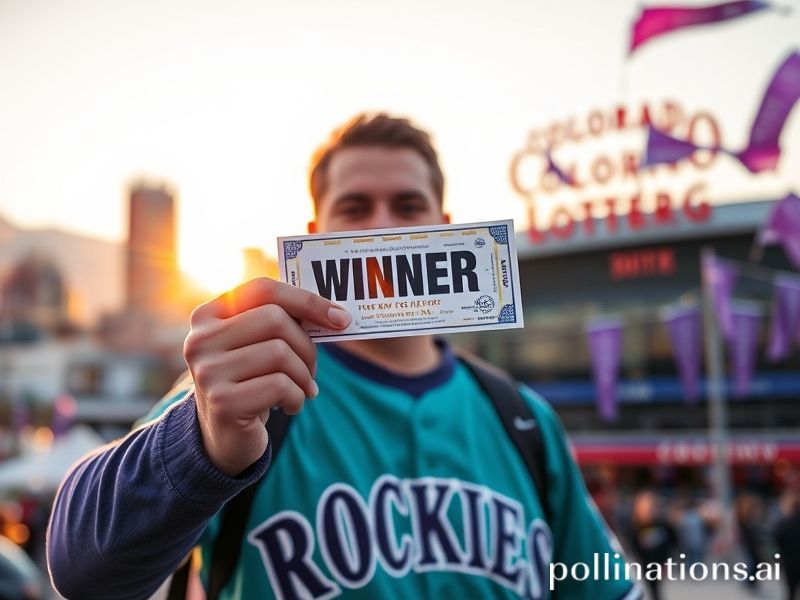colorado lottery
Mile-High Mirage: How a Rocky Mountain Scratch Card Became a Global Parable
By the time the Colorado Lottery’s latest Powerball billboard flickered to life above Denver International—a smiling elk promising life-changing jackpots to anyone who can read English and ignore basic statistics—three continents were already taking notes. From Singapore’s Marina Bay to Lagos’s Balogun Market, state-run games of chance have become the neon-lit confessionals of late capitalism, and Colorado’s particular brand of alpine optimism offers a case study in how to monetize altitude sickness.
Let’s zoom out: lotteries worldwide now move more money than the GDP of Finland. China’s state sports lottery alone raked in $60 billion last year, enough to fund every public hospital in Sichuan or, more practically, one medium-sized Belt-and-Road bridge to nowhere. Across the Atlantic, Italy’s Sisal games keep entire villages solvent between olive harvests, while Spain’s El Gordo turns Christmas into a socialist kumbaya where grandmothers hand out thousand-euro notes like cough drops. Compared with that operatic generosity, Colorado’s modest $1.8 billion annual handle looks almost quaint—like bringing a gluten-free muffin to a paella orgy.
Still, the Centennial State has innovations the world quietly envies. First, there’s the branding: pastel mountain silhouettes, hashtags that read like yoga mantras (#AdventureAwaits), and the unspoken promise that if you win, you’ll suddenly own both a Subaru and a conscience. Second, Colorado earmarks proceeds for “Great Outdoors Colorado,” a program that buys up open space so future losers can hike in peace—environmental absolution one scratcher at a time. In effect, the lottery functions as a voluntary carbon tax on people who can’t afford Teslas.
Globally, the implications are deliciously bleak. The International Monetary Fund, in a footnote buried so deep it might as well be a confession, notes that rising lottery revenues correlate with rising inequality. Translation: the poorer the populace, the shinier the scratch cards. Greece, still limping from austerity, just launched a “Golden Visa Raffle” where the top prize is an EU passport; second prize is, naturally, a prepaid funeral plan. Meanwhile, South Africa’s PowerBall ads now feature actual lions, presumably to remind players what real odds look like.
Colorado’s contribution to this planetary circus is subtler but no less cynical. Observe the demographic choreography: billboards cluster along I-70 east of Denver, where median household income dips 20 percent below the state average. They vanish once you reach Boulder, replaced by ads for anti-aging clinics and oat-milk IPOs. The message is as crisp as January air: aspiration is altitude-adjusted. A ticket bought at 5,280 feet offers the same mathematical despair as one bought at sea level, but at least the disappointment comes with a panoramic view.
International observers—particularly those from countries where gambling is either banned or monopolized by the army—marvel at how openly American states flaunt their moral gymnastics. Legislators who won’t fund preschools via taxes will happily bankroll them via Keno. It’s a fiscal judo move that would make even the Vatican’s accountants blush. And because Colorado’s proceeds go to trails, wetlands, and the occasional prairie-dog rescue, every losing ticket doubles as a tree-hugging indulgence. Think of it as GoFundMe for Mother Nature, except the platform keeps 50 percent and Mother Nature doesn’t have a verified account.
The darker punchline arrives with the winners themselves. Statistically, one in three will file for bankruptcy within five years, a metric that holds from Jakarta to Johannesburg. The Colorado Lottery’s own internal memo—leaked by a disgruntled intern who apparently believed transparency was still a thing—shows that the “financial counseling” provided to jackpot winners consists of a toll-free number and a brochure titled “So You’re Suddenly Rich, Try Not to Buy a Helicopter.” That brochure is printed on recycled paper, because irony is the only resource we’re not running out of.
As dusk settles over the Rockies, the billboards glow brighter, powered by the same grid that will eventually fail during the next megafire. Somewhere in Dubai, a sovereign-wealth fund manager bookmarks Colorado’s yield curve for a PowerPoint titled “Revenue Streams in Post-Democratic Economies.” And somewhere in Pueblo, a warehouse worker buys a ticket because, as he tells the clerk, “the mountains aren’t getting any cheaper.” He’s right, of course. The mountains are priceless; it’s the hope that’s on sale, two dollars at a time, until the snow melts or the math finally wins.







